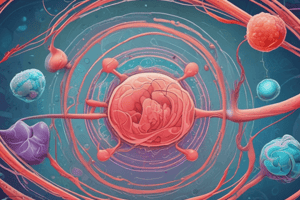Podcast
Questions and Answers
What characterizes pluripotent stem cells?
What characterizes pluripotent stem cells?
- They are only found in adults.
- They are limited to forming bone marrow cells.
- They have the potential to differentiate into any other type of cell. (correct)
- They can create only specialized cells.
Which of the following accurately describes tissue stem cells?
Which of the following accurately describes tissue stem cells?
- They can transform into any cell type available.
- They are multipotent and can create a limited range of cell types. (correct)
- They are derived from embryos.
- They are primarily used in embryonic research.
In the context of leukemia treatment, what must occur prior to a successful stem cell transplant?
In the context of leukemia treatment, what must occur prior to a successful stem cell transplant?
- Only diseased red blood cells are removed.
- The patient's healthy bone marrow cells need to be stimulated.
- All diseased white blood cells must be removed and bone marrow must be killed. (correct)
- The process must begin with collecting stem cells from the patient's own blood.
What is the primary use of cord blood cell banking?
What is the primary use of cord blood cell banking?
What distinguishes embryonic stem cells from adult stem cells?
What distinguishes embryonic stem cells from adult stem cells?
Flashcards
What are stem cells?
What are stem cells?
Cells that are undifferentiated and can divide into any other type of cell.
What is cell differentiation?
What is cell differentiation?
The process of a cell becoming specialized to perform a specific function.
What are embryonic stem cells?
What are embryonic stem cells?
Stem cells found in embryos, capable of becoming any type of cell.
What are tissue stem cells?
What are tissue stem cells?
Signup and view all the flashcards
What is tissue stem cell transplantation?
What is tissue stem cell transplantation?
Signup and view all the flashcards
Study Notes
Stem Cells
- Stem cells are undifferentiated cells capable of developing into any other cell type.
- Cell differentiation is the process where cells specialize for specific functions.
Types of Stem Cells
- Embryonic stem cells (from embryos) are pluripotent, meaning they can form any cell type.
- Tissue stem cells (from adult sources like bone marrow) are multipotent, meaning they can become several different cell types.
Uses of Stem Cells
- Cord Blood Cell Banking: Umbilical cord blood contains tissue stem cells that can be banked for potential future use.
- Tissue Stem Cell Transplantation: Healthy bone marrow cells (or blood stem cells) from a matched donor are transplanted to treat conditions like leukemia.
- Leukemia Treatment: Leukemia involves rapid division of blood cell-forming stem cells, disrupting blood cell function. Treatment necessitates removing diseased cells and destroying the bone marrow; successful transplants allow donor stem cells to generate healthy blood cells in the recipient.
Studying That Suits You
Use AI to generate personalized quizzes and flashcards to suit your learning preferences.




